Reverse Phase Protein Array (RPPA)反相蛋白微阵列技术介绍
反相蛋白微阵列(Reverse Phase Protein Array, RPPA)技术是一种结合平面高精度大规模样品蛋白抗原微阵列打印和抗体检测的高通量蛋白组学技术,该平台由MD安德森个体化治疗中心(IPCT)创始人Gordon Mills博士一手打造,并作为The Cancer Genome Atlas (TCGA)的核心蛋白组学技术平台,承担了33种癌种、超过10000例临床样本的数据的采集与分析工作,其相关研究成果发表在Nature、Cell、Cancer Cell、New England Journal of Medicine、Nature Biotechnology等学术杂志的高水平论文多达500篇以上。
RPPA技术平台设计严谨精密,流程高度自动化,质量控制极其严格,每次进行样品蛋白抗原微阵列打印,都会将多种阳性标准细胞系样品与待分析样品一起进行点阵,确保实验结果的高度可追溯、高度可信度与可重复性。RPPA可在15毫克组织中(米粒大小)一次性分析多达500种以上不同丰度蛋白,且抗体反应过程及靶点信号采集彼此独立,避免了不同靶标抗体反应之间的串扰及不同靶标丰度差异较大带来的信号采集无法兼容的问题,具有其它高通量蛋白组学所无可比拟的超高特异性和灵敏度,可以对大量细胞表面受体蛋白、细胞信号关键蛋白及蛋白修饰(磷酸化、乙酰化、甲基化等)、蛋白酶类、转录因子等各类代表性靶标进行分门别类的系统深度检测,也可根据需求定制所需研究的靶点蛋白进行分析,包括直接和间接的上下游蛋白网络分析。RPPA可应用于蛋白功能与调控机理分析、细胞信号转导全景扫描、肿瘤标志物及蛋白分子分型、药物靶标发现与药物机理分析等不同领域。
尽管TCGA以及Pan-Cancer Atlas为肿瘤学研究提供了宝贵的第一手资料,然而临床医学研究者往往因缺乏生物信息学基础,而在处理这些大规模的具有巨大潜在价值的癌症数据时感到心有余而力不足。作为RPPA在中国唯一授权的技术服务平台,非因生物提供与TCGA完全相同的RPPA标准化大规模样品制备、点阵、检测及相关生物信息学联合分析全套解决方案,并提供个性化的附加靶点分析服务,为中国临床转化医学研究和药物研发提供独特而强大的技术平台支持。
RPPA-源于MD安德森TCGA的蛋白组学分析策略
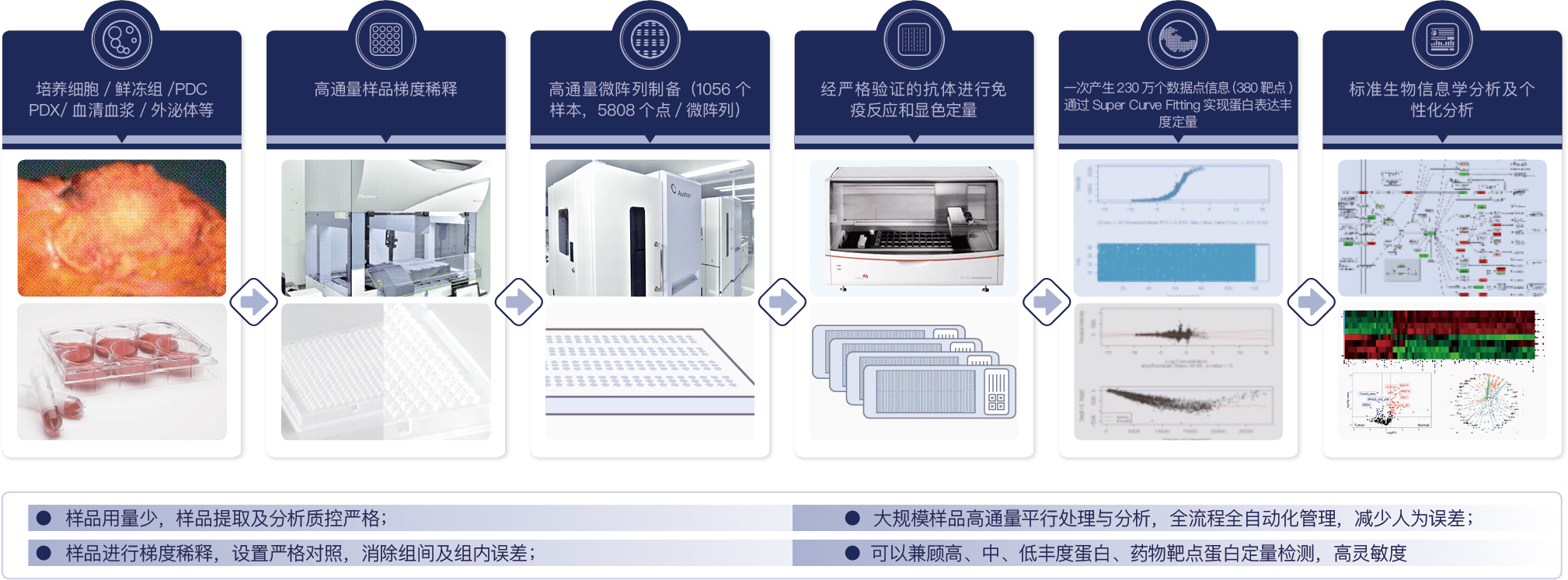
RPPA技术服务的应用场景
目前,根据不同分析需求,非因生物RPPA技术服务可以支持以下两大模式的应用场景
疾病信号通路全景扫描及分子机理挖掘
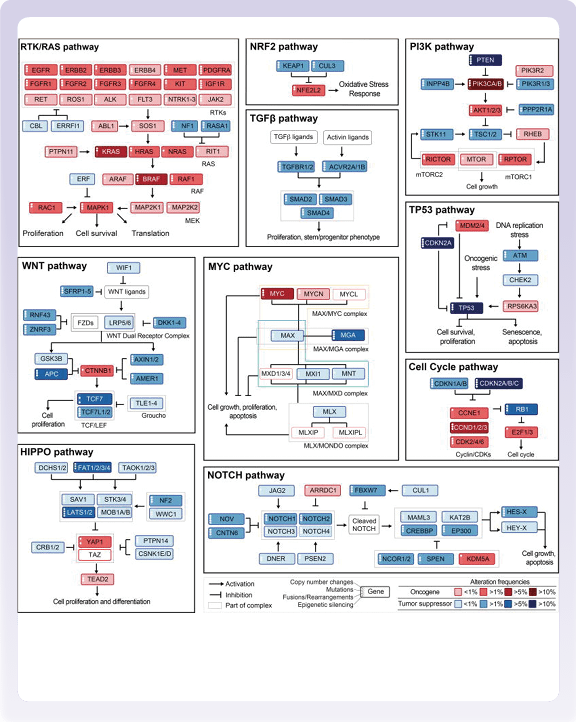
该场景适用于以下应用方向:
-
蛋白功能分析
-
细胞信号转导机理研究
-
疾病模型分子机理挖掘与探索性研究
-
临床队列样本功能蛋白组学研究
-
临床队列样本基于蛋白组学的分子分型研究
-
临床样本的生物标志物探索与验证
-
临床样本疾病突变基因相关蛋白分子病理研究
-
临床样本多组学共分析
肿瘤相关药理学研究与靶向药物开发
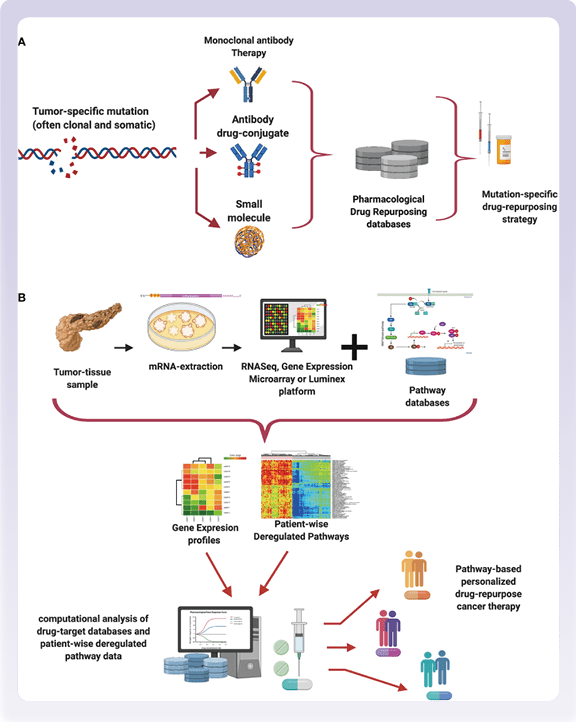
该场景适用于以下应用方向:
-
靶向药物及药物组合系统性研究
-
靶向药物标志物发现与验证
-
体内外药物靶点on-target/off-target研究
-
药物作用机理MOA研究
-
先导化合物机理验证与优化筛选
-
临床前药物剂量选择研究
-
临床(前)安全性评估
-
临床试验临床试验入组人群筛选及药效评估
RPPA技术服务特点与优势
样本需求量小
20-40 微克蛋白即可实现380 靶点检测,能够满足 RPPA分析的样品范围广,包括临床实体瘤手术样品、穿刺活检标本、PDX模型样品、体外培养细胞、3D培养物等都广泛适用。
标准化的样品处理和分析
蛋白及蛋白修饰位点在蛋白变性后的线性状态下检测,样本稳定性高,消除表位识别中潜在的问题。基于 IS015189 质量管理体系的标准化技术流程,质控严格,能够高效对大样本平行进行检测,数据分析与评估。
靶点独立检测 样本通量高
针对一个检测靶标,在同一反应微环境下平行分析100-1000 个样本,样本通量明显高于其他蛋白组学技术平台,而且独立进行各靶点检测反应,完全排除不同靶点间信号串扰问题。
不同丰度靶点信号兼容性高
兼具系统性与灵活性
专业和丰富的 RPPA 技术服务经验
强大的数据综合分析及深度挖掘能力
RPPA技术平台应用文献
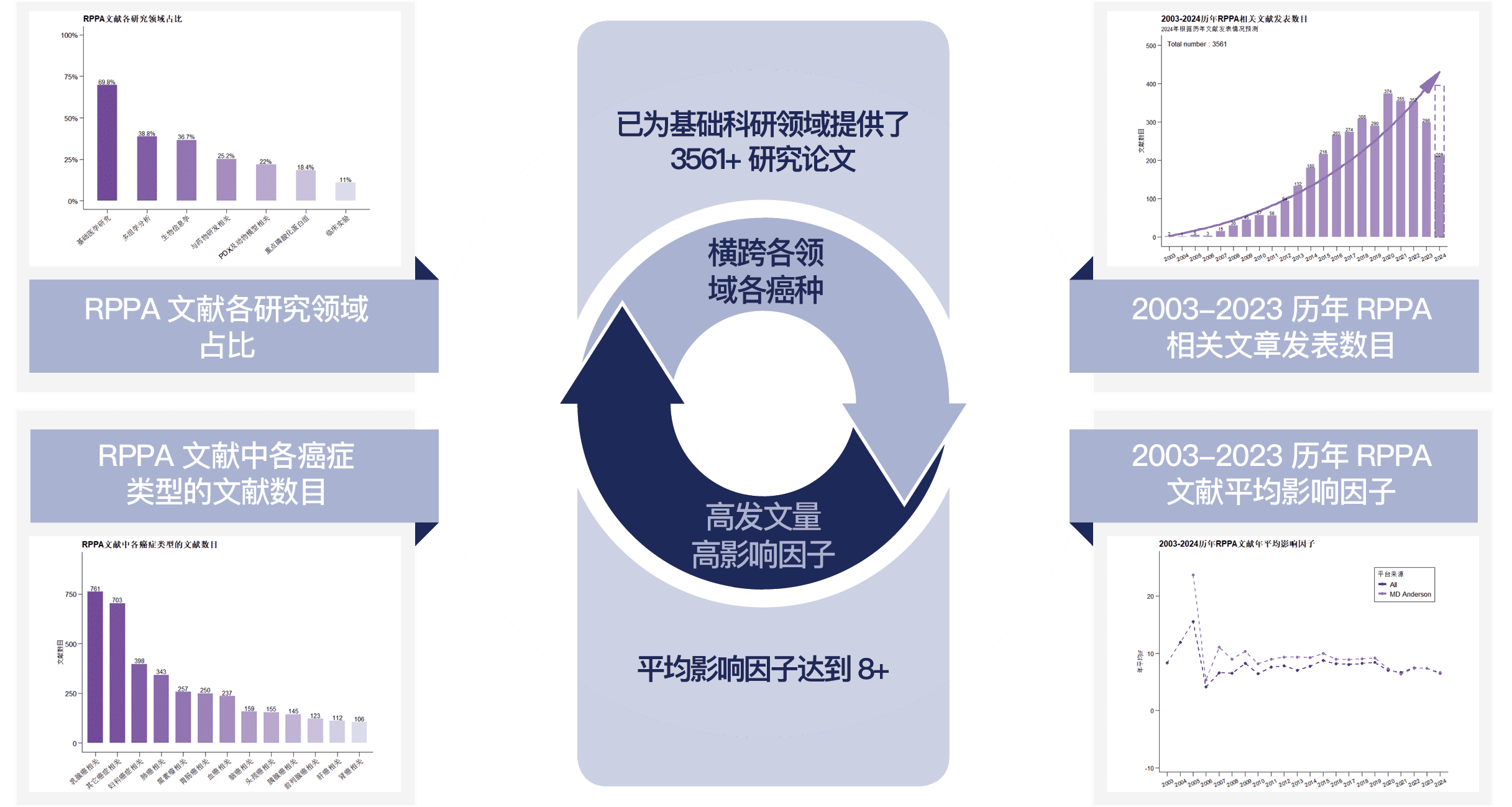
利用RPPA分析平台发表的代表性文献
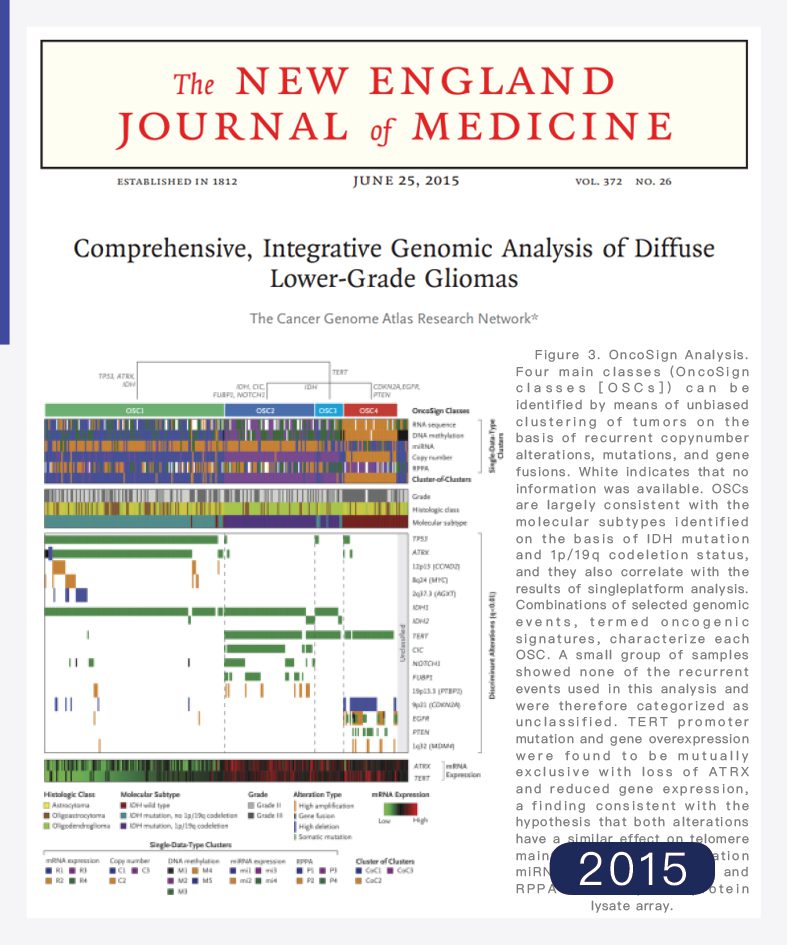
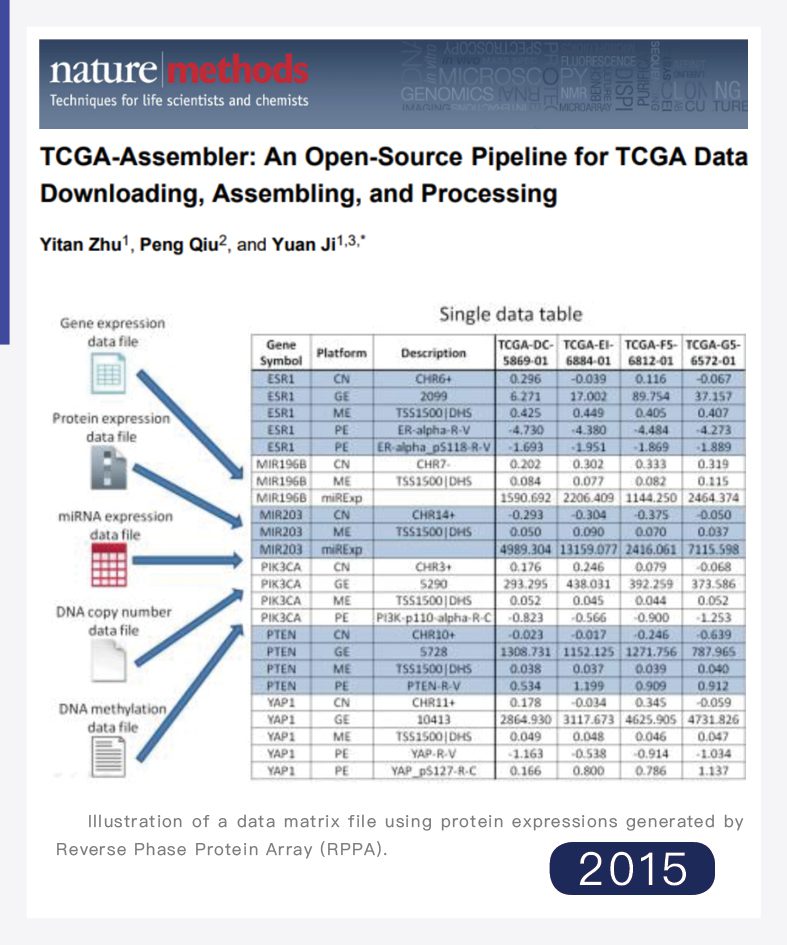
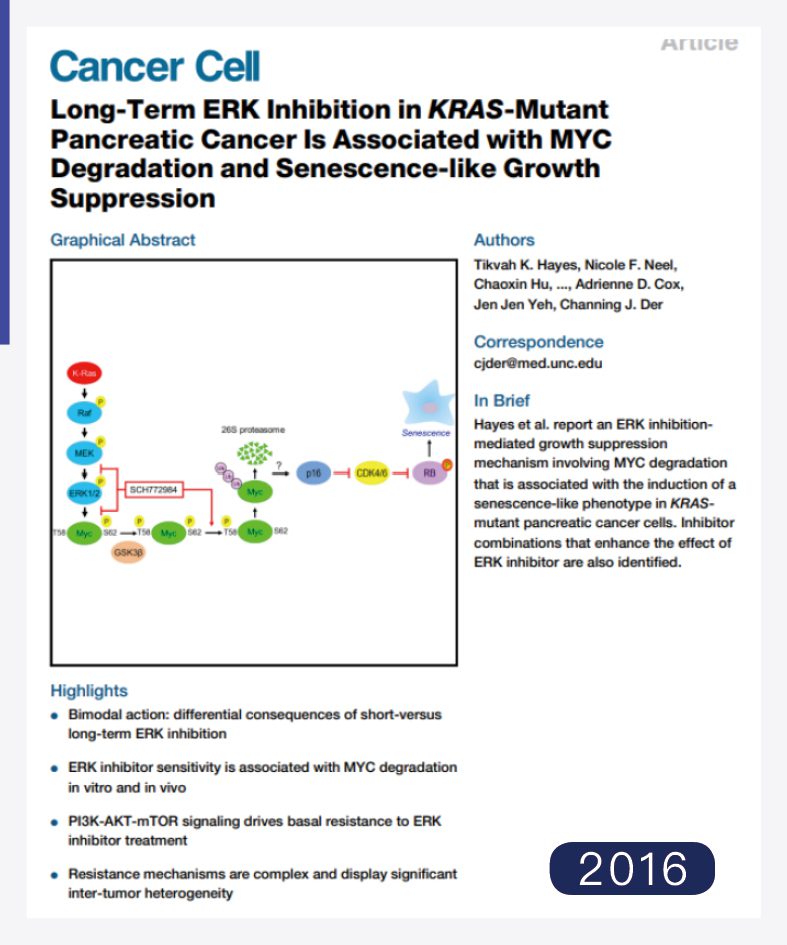
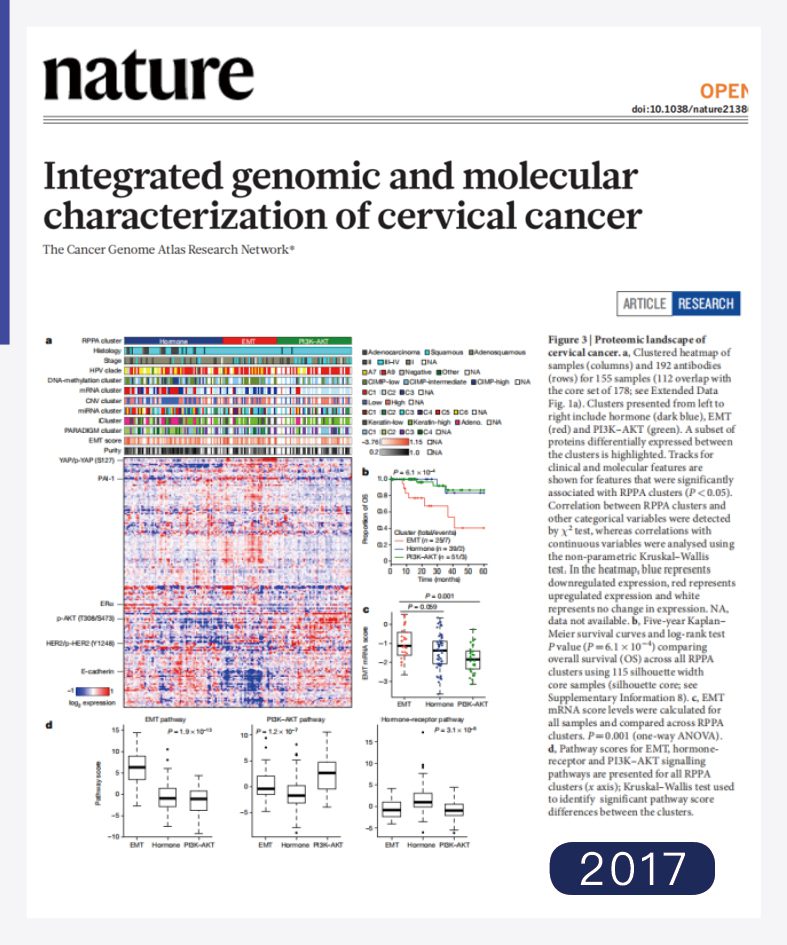
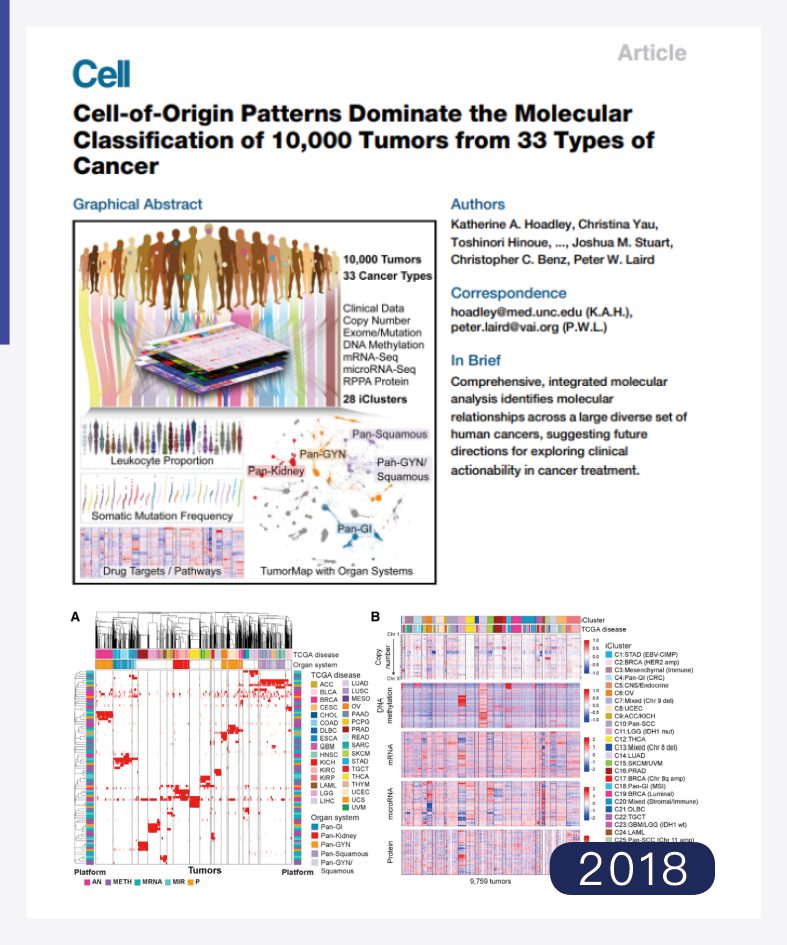
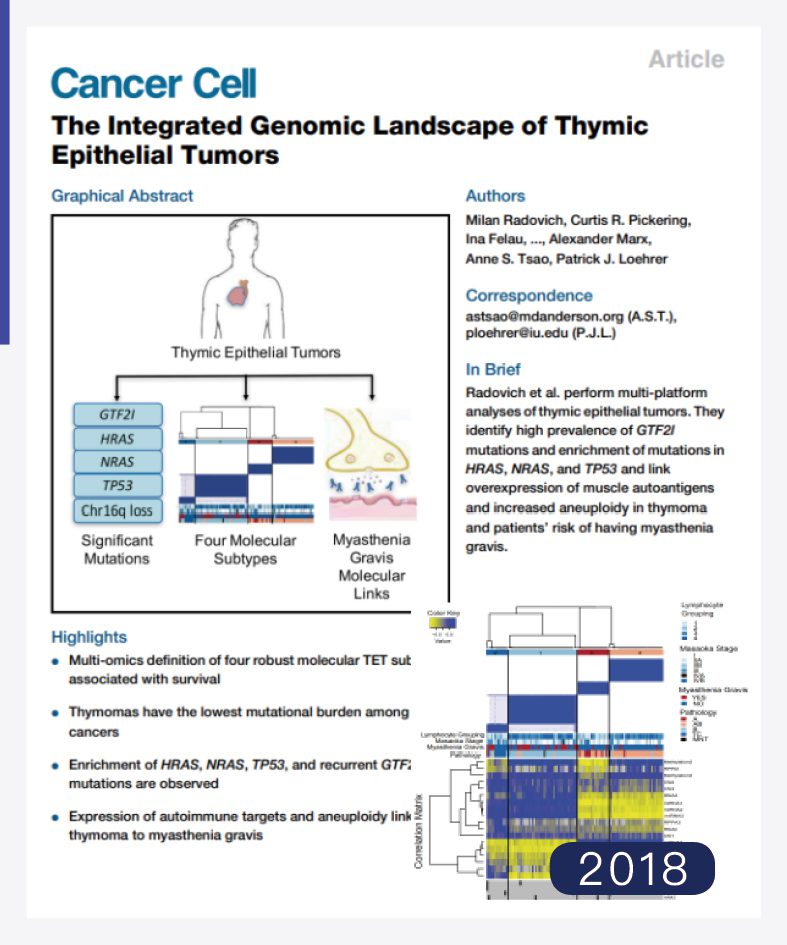
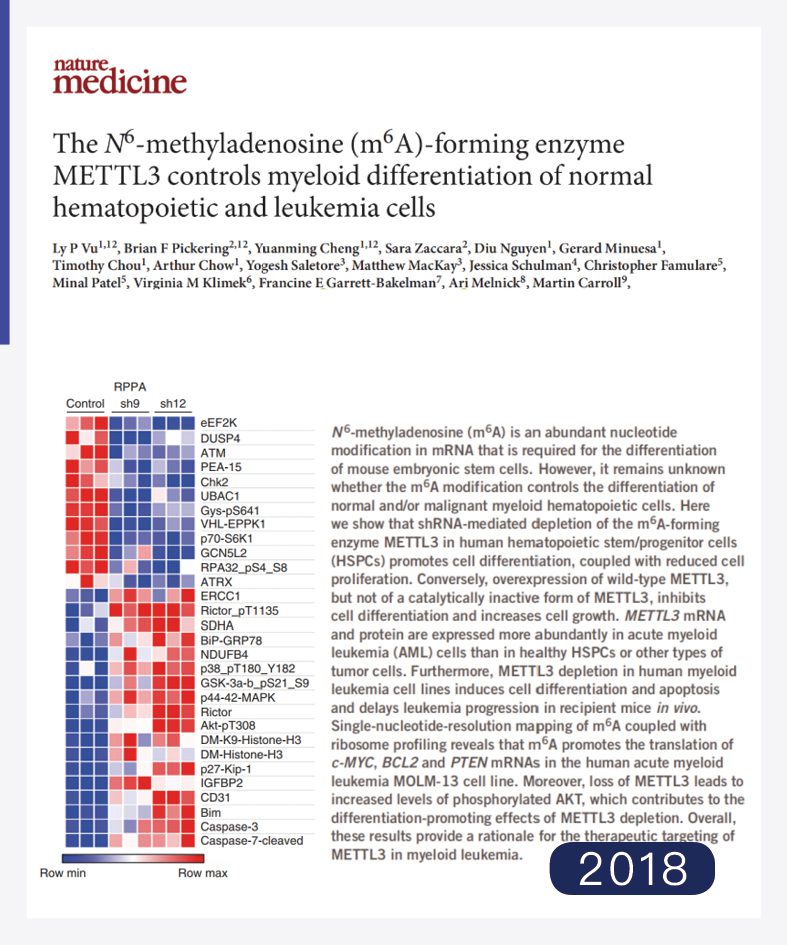
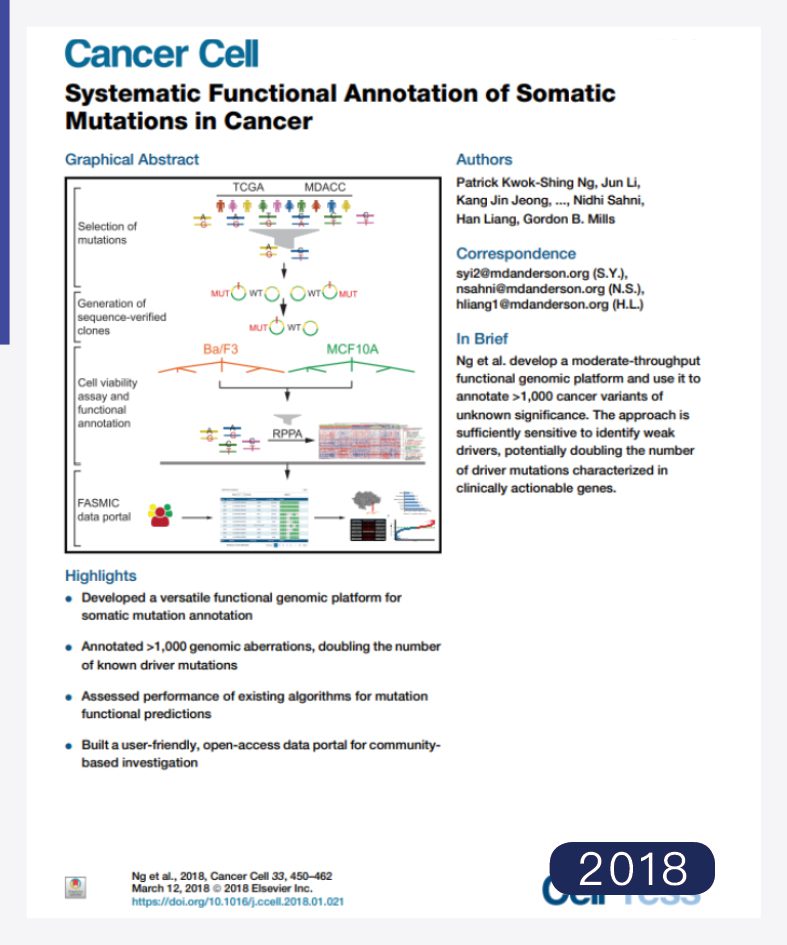
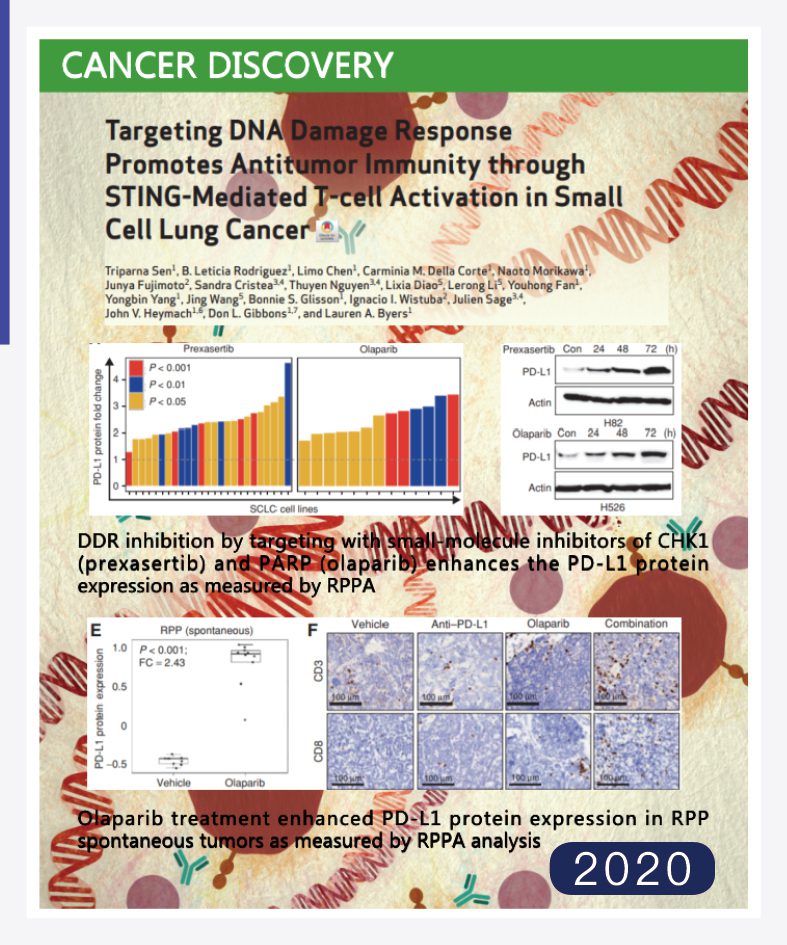
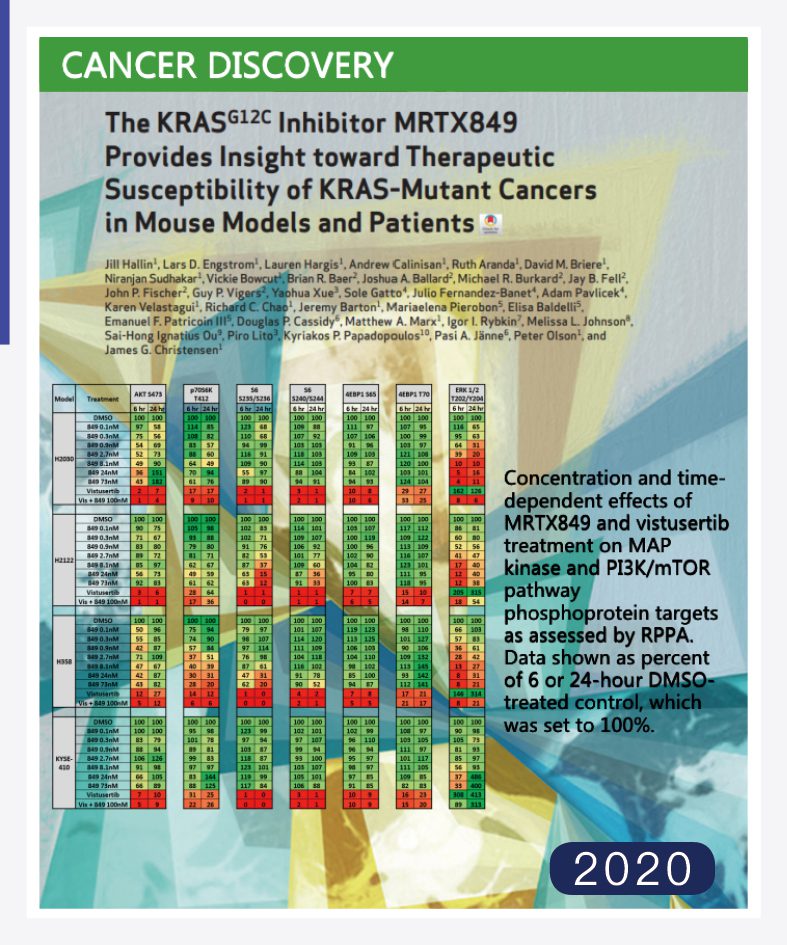
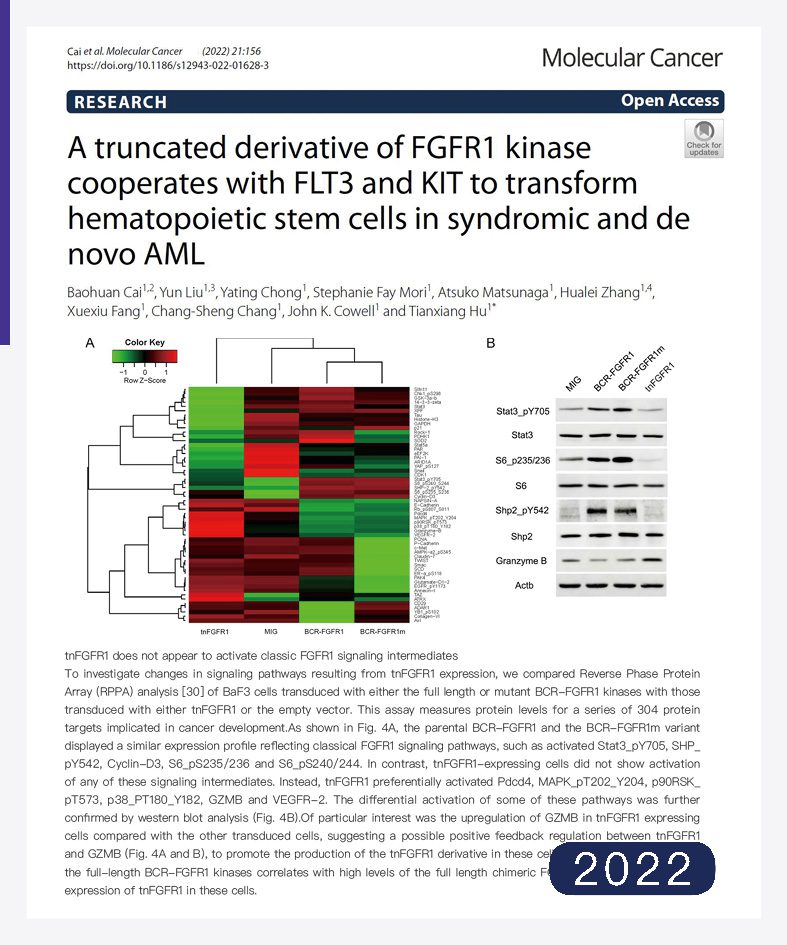
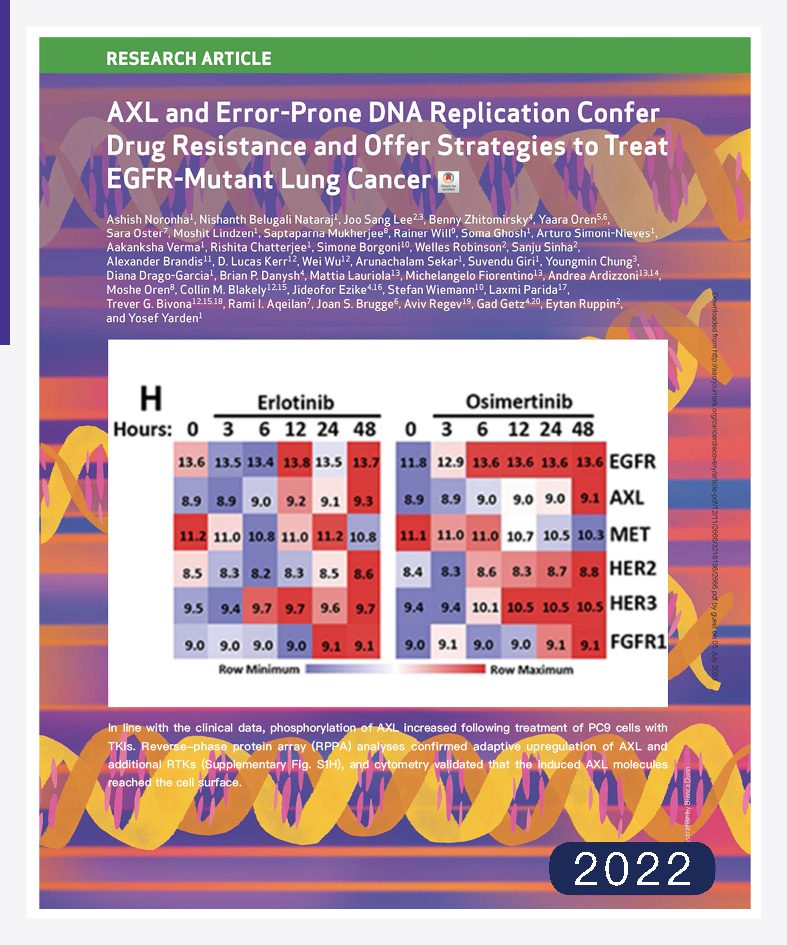
参考文献
| PMID | 文献名 | 发表期刊 | 影响因子 |
|---|---|---|---|
| 26061751 | Comprehensive, Integrative Genomic Analysis of Diffuse Lower-Grade Gliomas | N Engl J Med | 79.258 |
| 28112728 | Integrated genomic and molecular characterization of cervical cancer | Nature | 41.577 |
| 26091043 | Genomic Classification of Cutaneous Melanoma | Cell | 31.398 |
| 26451490 | Comprehensive Molecular Portraits of Invasive Lobular Breast Cancer | Cell | 31.398 |
| 29625048 | Cell-of-Origin Patterns Dominate the Molecular Classification of 10,000 Tumors from 33 Types of Cancer | Cell | 31.398 |
| 26901648 | Inferring causal molecular networks: empirical assessment through a community-based effort | Nat Methods | 30.822 |
| 28920958 | The N6-methyladenosine (m6A)-forming enzyme METTL3 controls myeloid differentiation of normal and leukemia cells | Nat Med | 30.641 |
| 24874569 | TCGA-Assembler: An Open-Source Pipeline for TCGA Data Downloading, Assembling, and Processing | Nat Methods | 28.467 |
| 26725216 | Long-Term ERK Inhibition in KRAS-Mutant Pancreatic Cancer Is Associated with MYC Degradation and Senescence-like Growth Suppression | Cancer Cell | 26.602 |
| 29438696 | The Integrated Genomic Landscape of Thymic Epithelial Tumors | Cancer Cell | 26.602 |
| 29533785 | Systematic Functional Annotation of Somatic Mutations in Cancer | Cancer Cell | 26.602 |
| 29706454 | A-to-I RNA Editing Contributes to Proteomic Diversity in Cancer | Cancer Cell | 26.602 |
| 30537514 | Resistance to epigenetic-targeted therapy engenders tumor cell vulnerabilities associated with enhancer remodeling | Cancer Cell | 26.602 |
| 30777870 | Targeting DNA damage response promotes anti-tumor immunity through STING-mediated T-cell activation in small cell lung cancer | Cancer Discov | 26.37 |
| 31649109 | Atypical KRASG12R Mutant Is Impaired in PI3K Signaling and Macropinocytosis in Pancreatic Cancer | Cancer Discov | 26.37 |
| 31658955 | The KRASG12C Inhibitor, MRTX849, Provides Insight Toward Therapeutic Susceptibility of KRAS Mutant Cancers in Mouse Models and Patients | Cancer Discov | 26.37 |
| 26691984 | Identification of significantly mutated regions across cancer types highlights a rich landscape of functional molecular alterations | Nat Genet | 25.455 |
| 33157050 | Large-Scale Characterization of Drug Responses of Clinically Relevant Proteins in Cancer Cell Lines | Cancer Cell | 24.722 |
| 25670079 | 14-3-3ζ turns TGF-β’s function from tumor suppressor to metastasis promoter in breast cancer by contextual changes of Smad partners from p53 to Gli2 | Cancer Cell | 23.916 |
| 27165744 | Comprehensive Pan-Genomic Characterization of Adrenocortical Carcinoma | Cancer Cell | 22.844 |
| 28196595 | Characterization of Human Cancer Cell Lines by Reverse-phase Protein Arrays | Cancer Cell | 22.844 |
| 28292439 | Integrated Molecular Characterization of Uterine Carcinosarcoma | Cancer Cell | 22.844 |
| 28528867 | A Pan-Cancer Proteogenomic Atlas of PI3K/AKT/mTOR Pathway Alterations | Cancer Cell | 22.844 |
| 28810144 | Integrated Genomic Characterization of Pancreatic Ductal Adenocarcinoma | Cancer Cell | 22.844 |
| 29533782 | BRD4 Inhibition Is Synthetic Lethal with PARP Inhibitors through the Induction of Homologous Recombination Deficiency | Cancer Cell | 22.844 |
| 30209121 | B-cell receptor-mediated NFATc1 activation induces IL-10/STAT3/PD-L1 signaling in diffuse large B-cell lymphoma | Blood | 22.113 |
| 30867319 | ZEB1 suppression sensitizes KRAS mutant cancers to MEK inhibition by an IL17RD-dependent mechanism | Sci Transl Med | 17.953 |
| 28389531 | CHK1-targeted therapy to deplete DNA replication-stressed, p53-deficient, hyperdiploid colorectal cancer stem cells | Gut | 17.016 |
| 31068440 | Metabolic reprogramming toward oxidative phosphorylation identifies a therapeutic target for mantle cell lymphoma | Science Translational Medicine | 16.89 |
| 32907612 | Loss of FBXW7-mediated degradation of BRAF elicits resistance to BET inhibitors in adult T cell leukemia cells. | Mol Cancer | 15.302 |
| 27268264 | Atg7 suppression enhances chemotherapeutic agent sensitivity and overcomes stroma-mediated chemoresistance in acute myeloid leukemia | Blood | 15.132 |
| 29101238 | Glucocorticoid resistance is reverted by LCK inhibition in pediatric T-cell acute lymphoblastic leukemia | Blood | 15.132 |
| 30093402 | Molecular profiling reveals immunogenic cues in anaplastic large cell lymphomas with DUSP22 rearrangements | Blood | 15.132 |
| 23154546 | A Pilot Characterization of Human Lung NSCLC by Protein Pathway Activation Mapping | J Thorac Oncol | 13.375 |
| 33008901 | High-throughput small molecule screening reveals Nrf2-dependent and -independent pathways of cellular stress resistance | Sci Adv | 13.116 |
| 32068166 | STING pathway expression identifies non-small cell lung cancers with an immune-responsive phenotype | J Thorac Oncol | 12.46 |
| 26081979 | The ZNF304-integrin axis protects against anoikis in cancer | Nat Commun | 12.353 |
| 31112530 | Tumor-intrinsic PIK3CA represses tumor immunogenicity in a model of pancreatic cancer | J Clin Invest | 12.282 |
| 26080861 | Characterization of twenty-five ovarian tumour cell lines that phenocopy primary tumours | Nat Commun | 12.121 |
| 28653662 | CDK4/6 and autophagy inhibitors synergistically induce senescence in Rb positive cytoplasmic cyclin E negative cancers | Nat Commun | 12.121 |
| 29725014 | Clinical and genomic landscape of gastric cancer with a mesenchymal phenotype | Nat Commun | 12.121 |
| 30755611 | Deregulated Gab2 phosphorylation mediates aberrant AKT and STAT3 signaling upon PIK3R1 loss in ovarian cancer | Nature Communications | 12.118 |
| 30962452 | Breast cancer quantitative proteome and proteogenomic landscape | Nature Communications | 12.118 |
| 32081846 | Immuno-genomic landscape of osteosarcoma | Nature Communications | 12.118 |
| 30143629 | SIRT6 haploinsufficiency induces BRAFV600E melanoma cell resistance to MAPK inhibitors via IGF signalling | Nat Commun | 11.878 |
| 30902996 | Dissecting heterogeneity in malignant pleural mesothelioma through histo-molecular gradients for clinical applications | Nat Commun | 11.878 |
| 32826891 | GLUT1 inhibition blocks growth of RB1-positive triple negative breast cancer | Nat Commun | 11.878 |
| 34741023 | Neoadjuvant T-DM1/pertuzumab and paclitaxel/trastuzumab/pertuzumab for HER2+ breast cancer in the adaptively randomized I-SPY2 trial | Nat Commun | 11.878 |



















